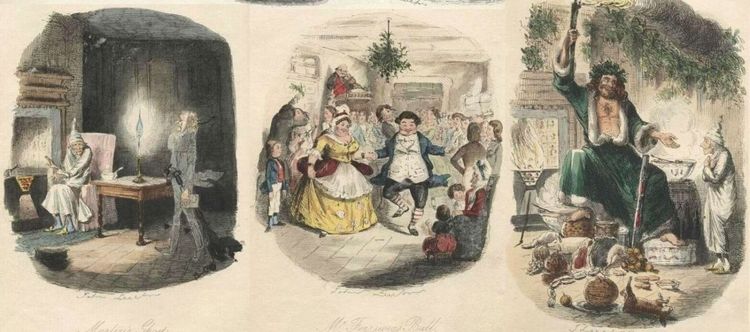


By Joe Guzzardi
12/19/2008
WAR AGAINST CHRISTMAS COMPETITION 2008: [blog] [I] [II] [III] [IV] [V] [VI][VII][VIII][IX][X][XI][XII][XIII] — See also: War Against Christmas 2007, 2006, 2005, 2004, 2003, 2002, 2001, 2000, 1999
Report all attempts to abolish Christmas to . A copy of Steve Sailer’s AMERICA’s HALF-BLOOD PRINCE to the most outrageous!
In Charles Dickens' Victorian England, Christmas was not even distantly similar to what it evolved into two hundred years later.
In the mid-19th Century, there were no Christmas cards, no decorated trees, no retail store sales, no turkeys or roasts, no gift exchange, no parties, no parade of lights and certainly no Santa Claus. The public barely acknowledged Christmas and considered it a minor holiday when compared to Easter.
In the eyes of many, Christmas was more closely associated with paganism than with the birth of Jesus.
A recently released book by Les Standiford titled The Man Who Invented Christmas: How Charles Dickens' Christmas Carol Rescued His Career and Revived Our Holiday Spirits, boldly attributes the Christmas revival in Western Civilization over the last two decades to Dickens and his short tale.
While the claim that Dickens "invented" Christmas may seem an overstatement, in his 1844 review of A Christmas Carol, British poet Thomas Hood agreed, noting: "If Christmas, with its ancient and hospitable customs, its social and charitable observances, were in danger of decay, this is the book that would give them a new lease."
Standiford points out that Dickens' novel provided a secular counterpoint to the Nativity story and gave readers an example of what the true Christmas spirit meant, including social justice and a decent life for all.
Wrote Standiford: "Just as vital as the celebration of the birth of a holy savior into a human family was the glorification and defense of the family unit itself."
What’s most remarkable about A Christmas Carol is that even though it was written in a mere six weeks almost 165 years ago, the novel’s theme of greed and social injustice could not be more timely.
Is there much difference between Ebenezer Scrooge, the financier who has devoted his life to the accumulation of wealth, and Richard Fuld or Bernard Madoff, the two disgraced Wall Street money grubbers?
The book has long been a central part of our Christmas season. And so have various stage performances, readings, radio dramas, television plays, Broadway musicals, symphonies and operas dating back for more than a century.
Over the years, Scrooge has been, at various times, presented as a gay man, a black man, a woman, a television executive and a Muppet.
Countless amateur and regional productions, some of which make clever use of local themes, are staged annually.
For example, during each year of its existence, the 11-year-old Pollard Theater in Guthrie, Okla., has performed ''A Territorial Christmas Carol,'' an adaptation set in Guthrie in 1889, during the Oklahoma land rush, with Scrooge as an evil land baron.
The troupe’s founding director, Charles C. Suggs 2d, said ticket sales for the classic sustained the theater through its first season. Currently sales run about 5,000 tickets during its six-week stint at the end of every year even though the city’s population is only 10,000. That’s twice the total of any of the theater’s other offerings. [Tale of a Cranky Londoner an All-American Classic, by Bruce Webber, New York Times, December 21, 1998]
Movie versions include a 1901 silent film followed then in 1938 with Reginald Owen as Scrooge; 1951, Alastair Sim; 1970, Albert Finney; 1984, George C. Scott; 1988, Bill Murray and 1999, Patrick Stuart.
Of all the Dickens’s works, A Christmas Carol is the most adapted. No other novel has left such an indelible mark on Western popular culture.
As a tribute to its greatness, A Christmas Carol has survived political correctness.
There has been — to the best of my knowledge — no performance titled A Holiday Carol or A Winter Festival Carol.